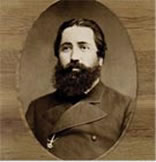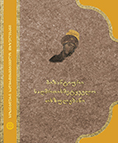 |
|
Scientific
and social journal SUMMARY
ZURAB TSUTSKIRIDZE
The history of mankind remembers many wars: short-term and long-term, chivalrous and ruthless, fair and unfair, separatistic and civil, with heroes and antiheroes; however, history does not remember a war like the Second World War with its extreme cruelty and large scale of destruction. Every European country including most of Asia and Americagot directly or indirectly drawn in the military actions. After the conquest of Europe, Hitler became so arrogant that he considered a campaign against the Soviet Union just a stroll in the park and convinced the Germans they would have a successful execution of “blitzkrieg”. This kind of faith had a strong technological, economic, social and political basis. The Germans and Western politicians did not take into account one important factor. They, apparently, did not properly estimate the role of a person in history. In particular, they overlooked the fact that the head of technically and economically trailing Soviet Union was Joseph Stalin. The victory of the Great War indeed depended on Stalin’s genius. In good time, everybody recognized it, including enemies and allies. Zhukov, a prominent Commander in the Second World War, was asked a question as to what led to the victory of the Soviet Union. He replied: Stalin’s speech during the parade of November 7th, 1941. Indeed, this was not an ordinary military parade or simple exhibition or display of forces. It was a miraculous proclamation of hope and faith, organized by a power that seemed to exceeded human capabilities.
GVANTSA KOPLATADZE
Saint Ilia the Righteous (Chavchavadze) played an important role to awaken and strengthen the Georgian people’s national self-consciousness at the end of the 19th and the beginning of the 20th centuries. History christened him as Crownless King of Georgia for that. An objective study of the battle that Ilia Chavchavadze carried out with his “Intellectual sword” against numerous enemies of his motherland unveils a rather deplorable fact. Georgian internal traitors fought against his ideological stand even more viciously and vigorously than strangers did. Hence, the ending result of the battle was logical. The selfless warrior struggling to save his nation was killed by his people, Georgians. If we want a better future for our country, Georgian society must once and for all stop using double standards when evaluating historical events or persons. It should assess everybody according to his or her merit and services performed.
ANZOR TOTADZE
The article suggests that the equal rights of men and women (gender equality) are a prerequisite for the development of society. The article provides a retrospective of the legal status of women and analyzes aspects of protecting the honor and dignity of women in the Georgian legal memorials. According to the author, the alarming data on violence against women in Georgia does not correspond to the real situation that the non-governmental organizations are trying to present. They are fabricating problems to receive grants. Based on the research and analysis of relevant literature, the article illustrates the real current situation of violence against women.
BORIS DARCHIA
The article concludes that the issue of transferring Lori to Armenia has not been studied with scientific thoroughness and requires further research.
NATELA ARVELADZE Theatre studies, a top field studying performance works is losing its role as a protagonist in terms of study and evaluation of the ongoing theatrical processes. Theater critics need a platform for their arguments just as much as actors and directors need a stage. The management of Vaso Abashidze Theatre of Music and Drama made it a tradition to invite critics and journalists to view the performance a few days before its premiere. Afterwards, a meeting with the creative group and a discussion of the performance takes place. This activity contributes to the improvement of professional skills of the critics as well as the company. The article discusses an incident that occurred during a discussion of Henrik Ibsen’s play “Ghosts”. The artistic director of the theater and a young stage director showed a clear dissatisfaction towards the critics’ remarks. The director of “Ghosts”, a play against violence, became verbally abusive towards the audience. The directors actions demonstrate the perception of criticism.
BORIS DARCHIA
At the beginning of the article, the author outlines the history of how Stalin’s poems were created, published and received rave reviews. Later, he critiques nihilistic and negative evaluations of these poems by G.Hornauli, R.Cheishvili and K.Chkheidze.
TINA IVELASHVILI
By 1914, the number of Armenians living in Turkey was 1 300 000. According to existing written sources, during the First World War, the number of Armenian victims did not exceed 300 000. Over time, by purposeful actions and deliberate falsification of the facts by Armenian historians and politicians, the number increased every year and in 1980, it reached 2 million. Regardless of the accusations towards Turks for carrying out an Armenian genocide during the First World War, initiators of every bloodshed were Armenians. The main instigator was a political party “Dashnaktsutyun”. Its purpose was the creation of an independent Armenian state on a territory belonging to the Ottoman Empire. To achieve this goal they sacrificed the lives of everybody including their compatriots. In the organization of the “Armenian Genocide,” the lion’s share belongs to Armenia’s “friends and allies”, (of the period) certain European countries and America. The political leaders of Western Europe inspired the Armenian population that their assistance and support would help the Armenians living in Turkey establish “independent free great Armenia” on Ottoman Empire territory. According to their instructions, Armenians needed to create some organizations that would convince Europe about the unprecedented persecution and oppression of Armenians in Turkey and the needed help from Europe to resolve the issue. By provoking the disturbance, they expected to create favorable conditions in order to interfere in the internal affairs of Turkey. |



